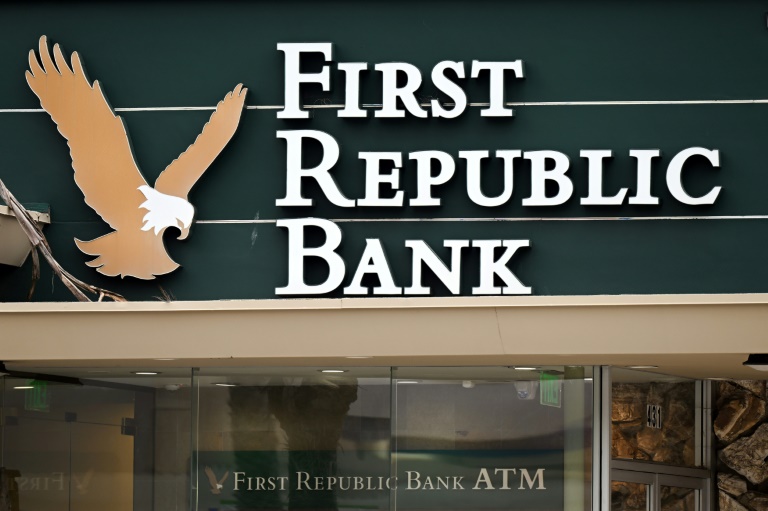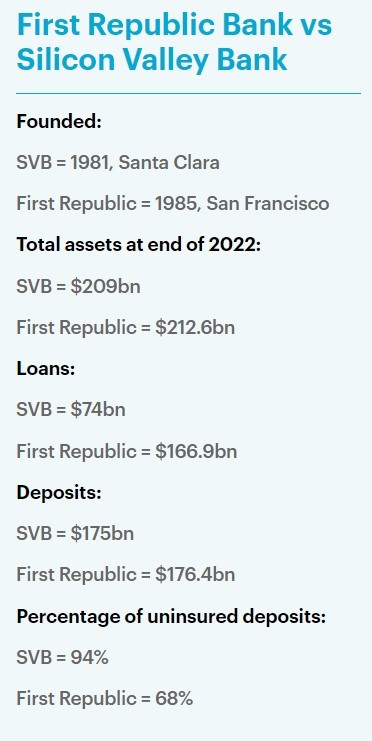
You’re probably fed up with discussions of First Republic’s failure and its acquisition by JPMorgan by now. It is a bit strange however, as First Republic is very much a bank for the wealthiest people in West Coast America (think of the bank of Mark Zuckerberg) so, what’s going on? If you already know, then don’t bother reading anymore, but here’s my take on it.
What we’ve seen is a loss of confidence.
It started with Signature Bank and Silicon Valley Bank, and spread to First Republic Bank (not forgetting the crypto exposed Silvergate Bank). In all three cases, it was the exposure to a sudden rise of interest rates that brought them down, followed by big questions about the future of the banks. For example, with $100 billion being withdrawn in just a short window at First Republic, then that is the issue we saw there. But why did deposit holders withdraw so much, so fast?
A loss of confidence.
A run on a bank is caused by a loss of confidence in the bank. In all three cases, it is clear that this is what happened. Is there contagion? Is this 2008 all over again? No. I still say no. The issue we are seeing is banks that were heavily tied to markets where they could not create enough liquidity as interest rates rose, being affected by a loss of confidence of their customers and investors.
Bear in mind that these banks are still viable, even though bankrupt. If they weren’t, why would HSBC* and JPMorgan take-over their dead bodies? Because they have customers? Because they have a loan book? Because they still have some deposits? Because they have branches? Because they have history?
Well, it’s all of those things. I’ve analysed the death of Silicon Valley Bank (SVB) before, so here is my take on First Republic.
First, it’s interesting how quickly the bank unravelled. People thought it would be ok, but it suffered the Halo effect of SVB’s collapse. The Halo effect is where you see something in one area that colours the picture of everything related to that area (more on Wikipedia).
Second, the bank seemed stable but, like SVB, had exposures to uninsured FDIC deposits that destabilised confidence.
Third, the bank offered huge home loans to wealthy clients that were interest only and easily open to defaults and failures.
Fourth, this is the second biggest bank failure in US banking history since the fall of Washington Mutual in 2008, which was the largest failure. Interestingly, in both cases, JPMorgan acquired their dead bodies in a sweet deal that made JPMorgan bigger and stronger.
Fifth, it shows how clever Jamie Dimon can be. Not only is he getting a major bank to add to the empire, but he is getting a major bank who are renowned for banking the wealthiest clients in America. That's pretty good news for JPMorgan chase, especially when the bank is bought for a bargain basement discount and huge backing from the FDIC (Federal Deposit Insurance Compensation) scheme.
Sixth, it raises big questions about the Federal Reserve. Not the Fed in general, but specifically the Federal Reserve Bank of San Francisco. Even before the collapse of First Republic, the leaders of the Federal Reserve bank were being investigated over the collapse of SVB. Now, we add First Republic to the dead banks of the West Coast, and there have to be questions asked.
Oh, and by the way, in case you haven’t kept up with it all, here is what happened, according to a group of commentators with a view on the bank:
First Republic Bank’s collapse marks the second-biggest banking failure in US history, topping Silicon Valley Bank’s collapse in March. Like SVB, First Republic is a midsized California-based lender with a specific client base—in this case, wealthy individuals—that made it particularly exposed to the shockwaves of the recent banking turmoil. First Republic tried to weather the storm itself, but after customers withdrew more than $100 billion in deposits in Q1 and its share price plunged nearly 75% last week alone, the government had to hang the “closed” sign on the door.
Three of the four largest-ever U.S. bank failures have occurred in the past two months. First Republic, with some $233 billion in assets at the end of the first quarter, ranks just behind the 2008 collapse of Washington Mutual Inc. Rounding out the top four are Silicon Valley Bank and Signature Bank, a New York-based lender that also failed in March.
At JPMorgan Chase & Co.’s 2022 investor day, Jamie Dimon told the audience to “watch out” for its wealth-management business. “One of our greatest opportunities” is locking in a greater share of high-net-worth clients, the bank’s chief executive officer said about a year ago. It might not have been quite how Dimon envisioned it, but JPMorgan’s acquisition of First Republic Bank is poised to turbocharge those plans for growth in wealth management.
First Republic Bank's collapse was part-triggered by its offer of attractive 'jumbo mortgages' to wealthy clients whose loans were interest-only for up to a decade. The failed bank sold loans with rock bottom rates to rich clients including Goldman Sachs President John Waldron and music mogul Todd Moscowitz, the former CEO of Warner Bros Records, who both purchased multimillion dollar New York City homes, property records show. These 'jumbo mortgages', a staple of First Republic's business model for decades, were a great deal for buyers - but became a huge burden for the bank when the Federal Reserve began to aggressively hike interest rates in 2022.
There is growing disquiet that America's largest bank is fast becoming “too big to fail”. The latest deal strengthens JP Morgan’s position as the US’s foremost lender, but will potentially trigger concerns that it is becoming too systemically important. The Telegraph estimates suggest it now holds an estimated 14.2% of US deposits, or $2.47 trillion, compared to 13.7% previously.
Meantime, my favourite columnist on such matters is Hugh Son, who writes for CNBC. Here’s his take on it from LinkedIn:
* Regulators went w/ JPM over other bids from regional banks including PNC because they prioritized the smallest financial hit to the FDIC, vs what could be perceived as handing the biggest US bank a sweet deal
* The deal is fairly sweet: It will add more than $500 million in profit to JPM a year, which could prove conservative.
* The FDIC is taking the first 80% of losses on FRC loans acquired by JPM for up to 7 years.
* JPMorgan, the industry's 800 lb gorilla w/ $3.7 trillion in assets before today, gets a little bigger: It's adding roughly $200 billion in assets and $92 billion in deposits
* By taking out the teetering bank, the acute phase of what happened in March is likely over, CEO Jamie Dimon says.
Meantime, if you want the full low-down, why not checkout the full slide deck from JPMorgan on the deal that happened:
Postnote:
Silicon Valley Bank: HSBC says UK buyout boosted profit by $1.5bn
Chris M Skinner
Chris Skinner is best known as an independent commentator on the financial markets through his blog, TheFinanser.com, as author of the bestselling book Digital Bank, and Chair of the European networking forum the Financial Services Club. He has been voted one of the most influential people in banking by The Financial Brand (as well as one of the best blogs), a FinTech Titan (Next Bank), one of the Fintech Leaders you need to follow (City AM, Deluxe and Jax Finance), as well as one of the Top 40 most influential people in financial technology by the Wall Street Journal's Financial News. To learn more click here...


